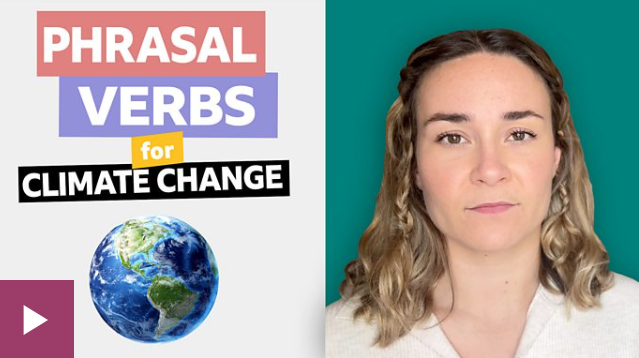Introduction
Georgie teaches you some phrasal verbs that can be used to talk about climate change.
Phrasal verbs mentioned
heat up
increase in temperature
- The planet is heating up due to a high level of CO2 in the atmosphere.
- If you put food in the microwave, it heats up.
rely on (something)
depend on something; need something for another thing to function
- Humans rely on fossil fuels to heat our homes and fuel our cars.
- When I broke my ankle, I relied on my family to help me around the house.
dry up
lose liquid and become dry
- This valley used to be a lake but it dried up centuries ago.
- The juice you spilled on the floor has finally dried up.
die out
gradually become extinct e.g. species
- If we don’t protect their habitats, many species will die out before the end of the century.
- Some traditional skills are dying out in modern society.
wipe (something) out
eliminate something, e.g. a species, in a sudden and destructive way
- Pollution and deforestation have wiped out entire ecosystems.
- The hurricane wiped out the entire neighbourhood, leaving only destruction and debris.
cut down on (something)
use or do less of something
- One way to combat climate change is to cut down on our use of fossil fuels.
- I’m going to start cutting down on sugar to improve my health.
fight for (something)
push for (something)
try really hard to achieve something or make it happen
- The community is fighting for cleaner air and water in their neighbourhood.
- The workers are pushing for higher wages and better conditions.
take part in (something)
participate in an activity or event
- I took part in a beach clean-up event and together we removed 200 bags of rubbish.
- Every year, we take part in a fundraising challenge to raise money for sustainability projects.
TOP TIPS!
- If you see the word ‘something’, it usually means the verb requires an object.
- If ‘something’ is in the middle of the phrasal verb, it means that it can be separated by the object (but doesn’t have to be).
- If ‘something’ is at the end of the phrasal verb, it means it cannot be separated.
- When a pronoun, e.g. him, her, them, is the object of a separable phrasal verb, it must go between the verb and the particle.
